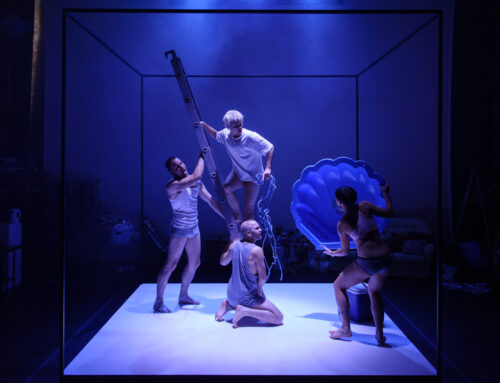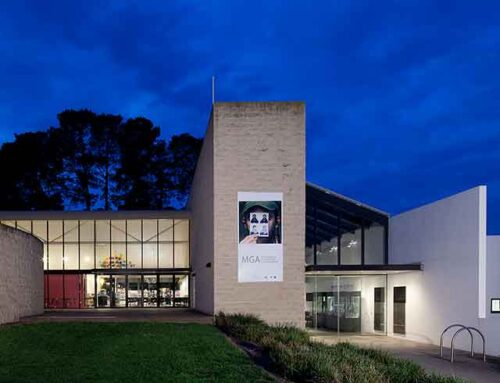Project Description
Quick Chats: Interview with Katherine Quigley from Backbone Youth Arts
As 2020 continues to unfold in wild and unruly ways, Positive Solutions is engaging with our colleagues in the arts and non-profit sectors to hear how they are adapting and coping. Quick Chats are short, sharp, bite-sized interviews with our peers in the hope that the ‘all in this together’ slogan can be put to work and deeply connect with people to foster conversations about the future of our sector.
The first in this series is Positive Solutions staff member, and Festival Director of Supercell: Festival of Contemporary Dance, Kate Usher speaking with Queensland arts leader, Kath Quigley. Kath is the Artistic Director and CEO of Backbone Youth Arts in Brisbane.
Kate Usher in conversation with Kath Quigley.
A date sometime in August. It was a blur of funding bids and phone calls.
Kate: Thanks so much for taking the time to chat with me today. You know I’m a long-time fan of Backbone, yourself and the brilliant, edgy, scrapy, and responsive leadership you provide for our community.
Kath: Awr.. thanks for thinking of me and the chat.
Kate:
Let’s dive right in.. Can you please sum up for us in a few words your experience in Backbone responding to Covid-19 ?
In a few words, Backbone’s experience of responding to COVID-19 was: panic, hackathon, community.
Backbone was incredibly quick at the start of the pandemic to pivot to an online program + offerings. Can you talk us through what enabled you to do this?
The start to 2020 was incredibly difficult for Backbone. Well, the end of 2019 was incredibly difficult. The Backbone Festival was impacted by bushfires – the air quality in Brisbane was so bad all of our outdoor activations on the greens were in jeopardy, the team put safety first and made sure that was the focus. We found out that our Australia Council application was unsuccessful. Our venue was broken into (twice.) It was just one hit after another. Throughout this time I was supported immensely by Backbone’s board. I was able to share difficult thoughts and see them really step up to the plate by providing incredible advice and support and critical, clear thinking. This relationship was key to being able to pivot the company quickly, without anyone holding on to “what we should be doing.”
Over the break I spent time with an old friend who lives in China, when they returned home in January I saw what was starting to happen in Wuhan. No clubbing, no going out, they worked from home already so there wasn’t a huge change in that. It was surreal to look at how things changed so rapidly. Then it hit my friends in South Korea. A completely different response – but again, it was clear that the first thing to go was social lives and in particular – going out. With the backdrop of our national treasures burning, the safety and future of our people and environment were at the forefront of my mind.
So honestly, by the time COVID-19 hit Brisbane I felt like I had already been through five apocalypses and had all the time we needed to consider what to do and how to change things, because so many of my friends and international peers had already been through it. I took the implications of the pandemic seriously – with so many disparate communities converging on the one space, the last thing I wanted was for Backbone to become the conduit between Aunty Rona killing someone’s grandparents.
We closed early, well before venues of our size had restrictions, and decided to focus on how we could maintain the work we had – our workshop programs, and how we could approach delivering online arts experiences like gigs, and what that would look like. The team started working from home early on to figure out how that works, and we did a hackathon for two weeks, where we spent time in ideation and testing phases, connecting with different cultural brokers in our communities to test new ideas and how they were received.
The nature of those artists and communities is unique – whether digital natives or interested in experimentation and exploration of ideas.. We have cultivated relationships with people who genuinely believe in trying new ideas. That’s the core philosophy that we extrapolated from youth arts and put into a physical space. To say yes to new ideas and support people to pursue them is something that we truly believe in. This put Backbone in a unique position even before the pandemic, making it possible to respond so quickly to the needs of artists and audiences.
Could you articulate for us the key factors in translating Backbone’s safe spaces and inclusivity ethos to an online space?
The key factors in ensuring our ethos of creating a safe space online is not too different from doing that in physical spaces. There are some technical considerations such as how to ensure Zoom doesn’t get hacked – and there were some programming considerations, but essentially we approached them the same way. We interrogated who we are here for and what different clients or audiences expected of us, and indeed, who would make use of the resources we had to offer online. Who are we here for with which program? What are the expectations of that community in terms of quality or depth of access? How do we make sure we are delivering it? Where are the feedback loops and what are we listening for in that feedback?
While we are a youth arts organisation, we have vastly different audience demographics that call Backbone home. With a physical space, it was easy to separate those expectations with providing different time slots for each activity. To be fair the six year olds would probably love the noise gigs, likely becoming superstars within the community overnight, but we knew that their space and the space for our underground music communities are different and require different things. So instead of offering just different time slots for the experiential/lived component of the online experience, we also used completely different digital platforms. Our Live n Solo gigs went onto youtube and Twitch streaming and our workshops used Zoom. Our online artist support for emerging artists used Facebook (and Zoom for weekly check ins) and our podcast was distributed via our website. In this way, it was like opening the door to different portals for different people at different times.
The key difference for Backbone was that our relationship with our audiences was not via a box office or email database. We know our communities and what they like doing. We knew they were worried and why, we had a direct link into their worlds online through social media. We care about our audiences not because they are good statistics to report, but because they are genuinely our friends and communities, Backbone is not an organisation that sits outside of these communities, we are authentically part of them. We could ask for feedback and support – because we knew they were ready to provide it and were just as worried about us as we were about them.
What has been the biggest blunder during this process, or what was the one thing that was horrifying in the moment but will be funny at a dinner party in a year’s time?
Honestly, there could have been some real doozies and I’m never shy of a good overshare, but I think we interrogated our ideas ahead of time using the hackathon method and therefore avoided anything too serious. We also had some pretty heavyweight geeks on our side so we had good advice and support throughout.
There was one online sector meeting that started just after my child decided to have a complete meltdown about science and some guy from Facebook marketplace was picking up my old couch. I felt like I was on that 90’s spray and wipe ad where the in-laws were coming over but instead of the spray and wipe working, there I was with the Artistic Directors of every major company in Brisbane right in the middle of my shit-storm of a kitchen. For me, the juggle of home schooling as a single parent and running an organisation will be the source of some deep-seated trauma for years to come. This might not be the place for me to open that can of worms, but I do hope that image has provided someone some humour.
With a suite of new digital tools, how do you envision these enhancing the programming and business model of Backbone into the future ?
We are really good at hosting people – in person or online, that’s what we do. That’s what we live for – we want to bring people together. Youth arts holds space for young people and youth subcultures who are searching for acceptance and creating a sense of self. How that translates into a venue for the community is that we also accept the challenges that adults are facing too – and we celebrate their different ways of expressing themselves and their subcultures.
Competing with real life and activities is exceptionally difficult, we would absolutely love to come together online more – and we have continued to have Zoom-based board meetings to save on time and energy, but truly, there is no substitute for sharing the same physical space when it comes to making work with children and young people or listening to live music.
Moreover, entering into a long tail economic environment after being in hospitality and education is absolutely not something our annual program could sustain in one year. Building that online economy is something that we will continue to do slowly, but without the revenues from workshops and bar sales, our organisation has taken a massive revenue hit. We would be closed without Jobkeeper, there is no other way to say it. We would be absolutely closed without that support.
Not only that, digital access is really not equal in Australia. For me personally, that is something I felt deeply uncomfortable about during 2020. The stark realisation that the digital and class divide were so intimately linked. So, the dream of having this amazing outreach because your Brisbane based company doesn’t want to drive all the way out West – just is not going to happen, especially if young people are the target demographic because not all young people have access to stable internet and devices from which to access it.
Kate: Thanks for sharing your experience, thoughts and hopes, dear Kath. We very much hope that we can see you in-person at Backbone Youth Arts for some of your exceptional and warm hosting. All the best for the next round of funding bids!
> Kath Quigley
Chief Executive Officer and Artistic Director of Backbone and Steering Member of Statewide and National Arts Sector advocacy groups. Kate is a scholarship recipient and graduate of NIDA’s inaugural cohort, Masters of Fine Arts, Cultural Leadership, and 2019 Alumni of the distinguished bilateral leadership network AIYD, host to 15 of the brightest young leaders from Australia and India annually. Kath has produced works ranging from large scale experimental chinese opera through to low budget independent productions with Queensland Theatre Company, Brisbane Festival, La Boite Theatre, Brisbane Powerhouse, Adelaide Fringe, Melbourne Fringe, Metro Arts, Theater Basel (Switzerland) and Hebbel Theatre and Haus der Berliner Festspiele (Germany) and Battersea Arts Centre (London). Kath is an advocate for young peoples and communities and is committed to providing support and opportunities for the development and presentation of First Nations works.
> Kate Usher
Kate Usher is the Festival Director for Supercell: Festival of Contemporary Dance and Research and Communications Officer at Positive Solutions. Kate graduated from the Queensland University of Technology in 2008 with a Bachelor of Creative Industries (Dance), a Graduate Certificate in Arts Administration in 2009 and a Masters in Creative Production and Arts Management in 2011. Kate’s previous engagements have included Ausdance Queensland as Executive Director, Associate Producer at Metro Arts, Producer at World Science Festival Brisbane, and her formative years were spent with the Queensland Performing Arts Centre in the Arts Programming team. Kate is the 2020 Weary Dunlop Scholarship recipient for the Asialink Business Leaders program.
> Backbone Youth Arts
To check out the excellent work at Backbone Youth Arts follow the links here:





